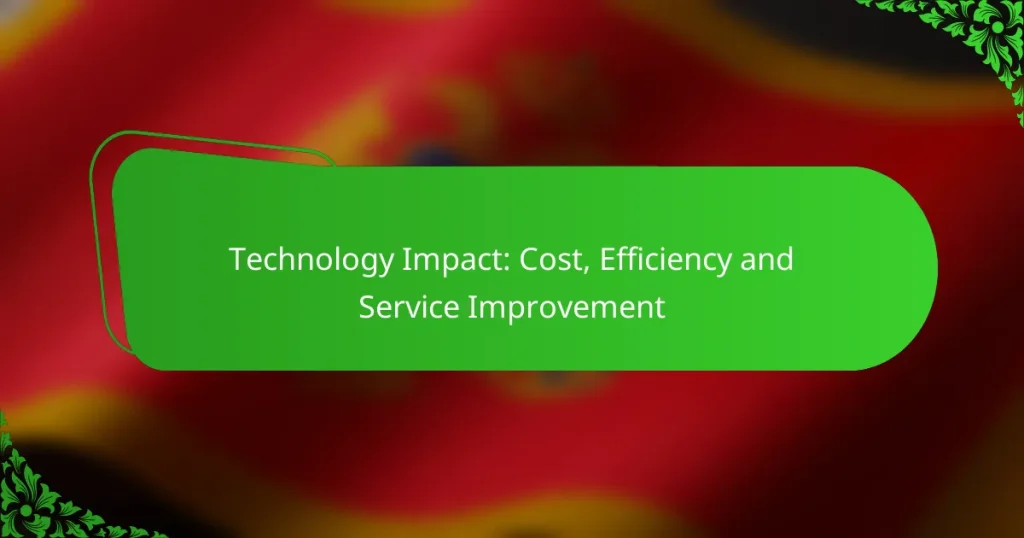
Technology Impact: Cost, Efficiency and Service Improvement
Technology plays a crucial role in transforming business operations by reducing costs and enhancing efficiency….
Carrion management services provide essential solutions for the safe and effective handling of dead animals, crucial for public health and environmental protection. These services operate through rapid response teams that coordinate with local authorities to ensure compliance with regulations and timely removal. By managing carrion effectively, they help mitigate health risks and contribute to a cleaner ecosystem.
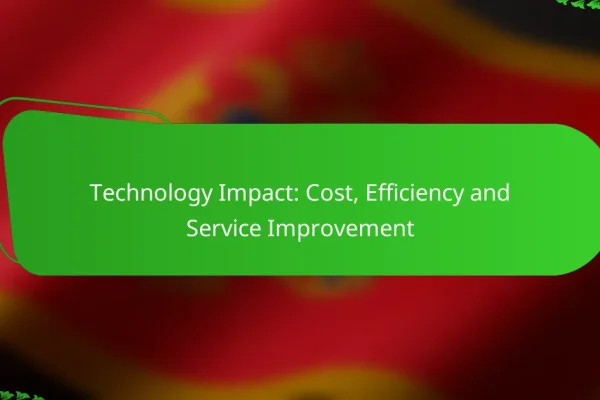
Technology plays a crucial role in transforming business operations by reducing costs and enhancing efficiency. By automating processes and optimizing resource allocation, companies can streamline their workflows, leading to faster service delivery and improved customer satisfaction. As a result, businesses not only lower their expenses but also foster stronger relationships with their clients through personalized…
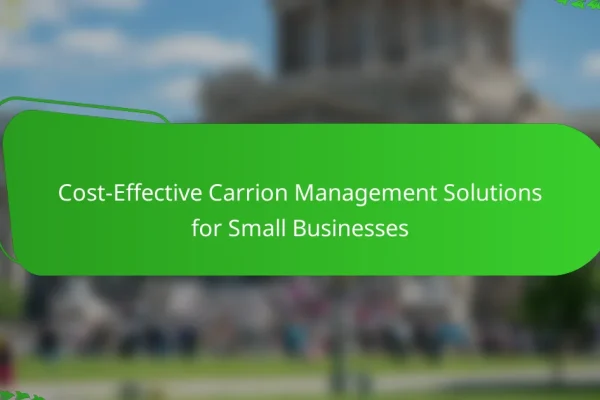
Cost-effective carrion management solutions are essential for small businesses looking to minimize expenses while adhering to local regulations. By leveraging available resources and forming partnerships with local agencies, businesses can implement sustainable practices that ensure responsible disposal of animal remains. Evaluating service reliability, pricing, and environmental impact is crucial in selecting the right management service…
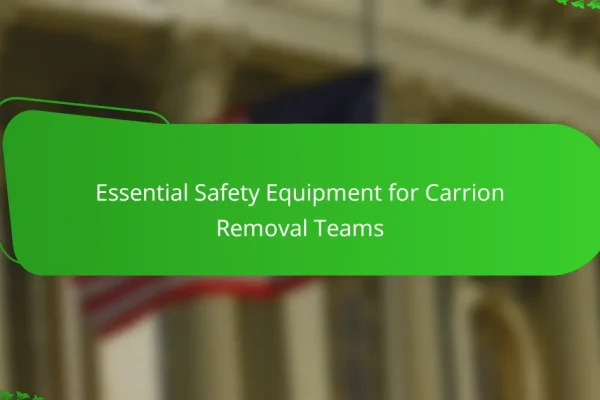
Carrion removal teams play a crucial role in maintaining urban hygiene, necessitating the use of specialized safety equipment to safeguard their health. Essential gear includes personal protective equipment (PPE), containment gear, disinfection tools, and waste disposal containers, all designed to ensure effective handling of deceased animals. Proper selection and maintenance of this equipment, along with…
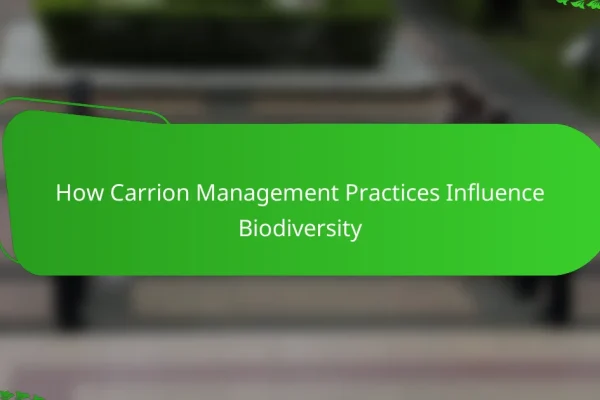
Carrion management practices play a crucial role in shaping biodiversity by influencing how decomposing organic matter is processed, which affects the species that depend on it for sustenance and habitat. By adopting effective strategies, ecosystems can thrive through improved nutrient cycling and support for scavenger species, ultimately fostering a healthier environment. How do carrion management…
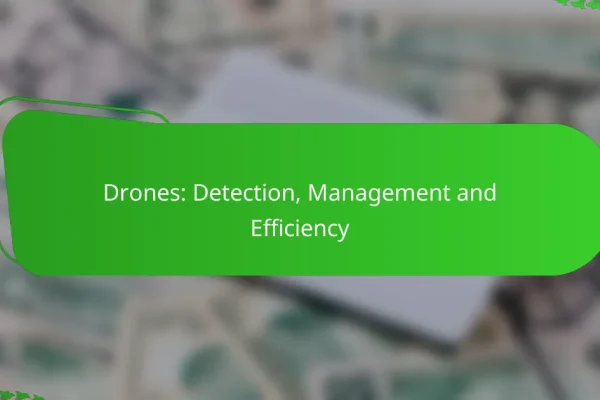
Drones are revolutionizing various industries by enhancing logistics efficiency and streamlining delivery processes. To ensure safe and effective integration of drones into airspace, advanced detection systems that utilize multiple technologies are essential for identifying and managing unauthorized drones. Implementing clear management protocols and integrating these systems with existing air traffic controls further enhances safety and…
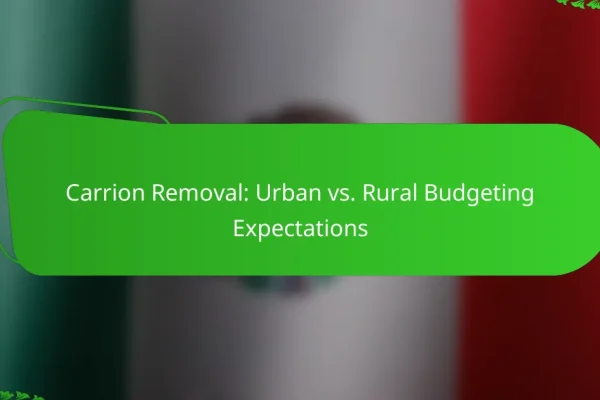
The budgeting for carrion removal varies significantly between urban and rural areas, influenced by factors such as population density and regulatory requirements. Urban municipalities typically face higher costs due to stricter health standards and the need for rapid response, while rural budgeting tends to be lower but requires careful planning to address unique logistical challenges….
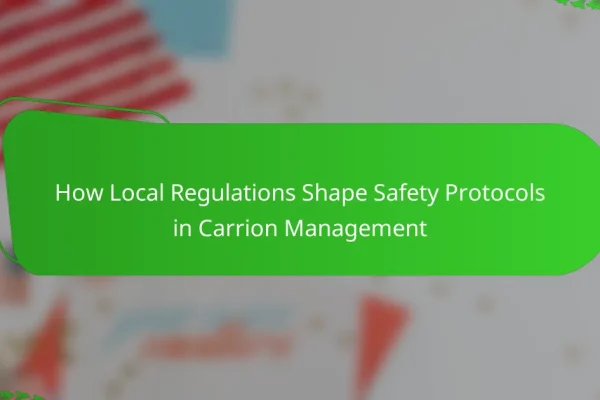
Local regulations play a crucial role in shaping safety protocols for carrion management, particularly in California, where they set standards for disposal methods and handling procedures. By enforcing these regulations, authorities aim to protect public health and the environment, ensuring that animal remains are managed safely and effectively. Compliance with these regulations not only mitigates…
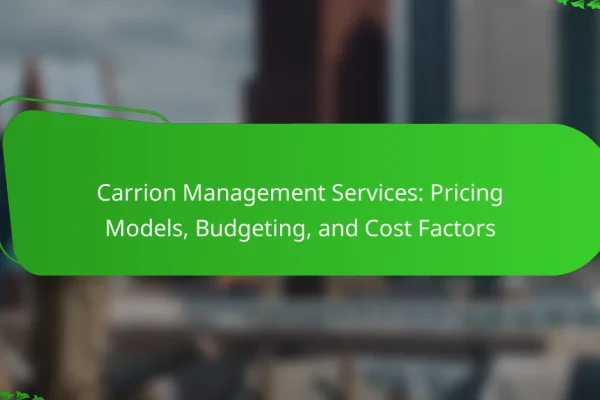
Carrion management services utilize various pricing models tailored to meet diverse client needs, making it essential for organizations to understand these options for effective budgeting. In urban settings, budgeting involves evaluating costs related to regular waste disposal, emergency services, and compliance with local regulations. Key cost factors include the type of carrion, location, and the…
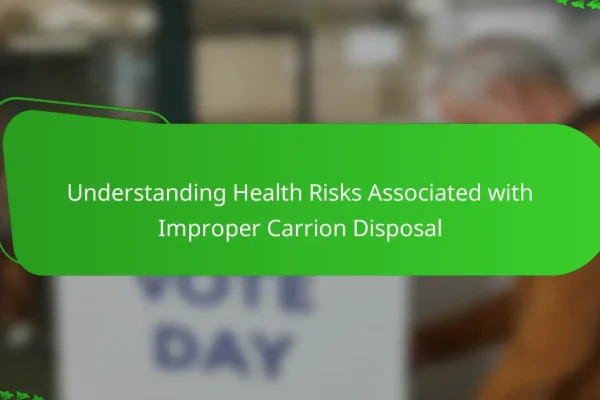
Improper disposal of carrion presents serious health risks due to the potential spread of diseases and the attraction of pests. When animal remains are not managed properly, they can serve as breeding grounds for harmful pathogens, endangering both human and animal health. Understanding these risks is crucial for implementing effective disposal methods that safeguard public…

As we navigate through 2023, emerging technologies such as artificial intelligence, blockchain, and 5G are revolutionizing industries and redefining business operations. These innovations not only streamline processes but also enhance customer interactions and create new revenue streams. With a focus on sustainability and advancements in remote work technologies, organizations that embrace these trends are poised…
Carrion management services encompass a range of solutions designed to handle dead animals effectively and safely. These services are essential for maintaining public health, preventing disease, and protecting the environment.
Dead animal removal is the primary service in carrion management, focusing on the safe and efficient disposal of carcasses. This process typically involves trained professionals who use specialized equipment to remove deceased animals from residential, commercial, or public areas.
It is crucial to act quickly when a dead animal is discovered, as delays can lead to health risks and unpleasant odors. Many companies offer same-day removal services, ensuring that the issue is addressed promptly.
After the removal of a dead animal, disinfection services are essential to eliminate pathogens and prevent the spread of disease. These services often involve the application of industrial-grade disinfectants to the area where the animal was found.
Effective disinfection not only addresses immediate health concerns but also helps to deter other wildlife from entering the area. It is advisable to choose a service that complies with local health regulations and uses environmentally safe products.
Environmental cleanup involves restoring the affected area to its original condition after a dead animal has been removed. This may include soil remediation, debris removal, and landscaping repairs.
Proper cleanup is vital to prevent contamination and ensure that the ecosystem remains healthy. Companies may offer tailored cleanup plans based on the specific circumstances, including the type of environment and the size of the area affected.
Odor control solutions are critical in managing the unpleasant smells associated with dead animals. These solutions can include deodorizing agents, air purifiers, and other odor-neutralizing products.
Implementing effective odor control can significantly improve the comfort of nearby residents and prevent attracting other wildlife. It is beneficial to consult with professionals who can recommend the best products and methods for specific situations.
Wildlife management services focus on preventing future incidents of dead animals by addressing underlying issues such as overpopulation or habitat encroachment. This may involve humane trapping and relocation of animals or implementing exclusion techniques to keep wildlife away from populated areas.
Effective wildlife management not only reduces the likelihood of dead animals but also promotes a balanced ecosystem. Engaging with local wildlife experts can provide insights into sustainable practices that benefit both the community and local fauna.
Carrion management services in urban areas involve the prompt removal and disposal of dead animals to maintain public health and safety. These services typically operate through rapid response teams that coordinate with local authorities to ensure efficient handling and compliance with regulations.
Rapid response teams are specialized units trained to quickly address carrion removal in urban settings. They are equipped to handle various types of animals, from small pets to larger wildlife, ensuring that the process is swift and minimizes public disruption.
These teams often operate 24/7, allowing them to respond to reports of dead animals at any time. Their quick action helps prevent potential health hazards, such as the spread of disease or attracting pests.
Effective carrion management requires close coordination with local authorities, including animal control and public health departments. This collaboration ensures that all actions comply with local regulations regarding animal disposal.
Local authorities often provide guidelines on reporting dead animals and may assist in monitoring areas prone to wildlife encounters. This partnership helps streamline the response process and enhances community awareness about proper reporting procedures.
Specialized equipment is essential for efficient carrion management in urban areas. This includes vehicles designed for safe transport and disposal, as well as tools for handling and removing deceased animals without risk to public health.
Additionally, some services utilize technology such as GPS tracking to optimize response times and routes. This ensures that teams can reach locations quickly, reducing the time carrion remains in public spaces and minimizing associated health risks.
Professional carrion management offers significant advantages, including improved public health, environmental protection, and adherence to local regulations. By effectively handling dead animals, these services mitigate health risks and promote a cleaner ecosystem.
Effective carrion management significantly reduces health risks associated with decomposing animals. Dead animals can harbor pathogens and attract scavengers, which may spread diseases to humans and pets. Professional services ensure safe removal and disposal, minimizing exposure to harmful bacteria and parasites.
Regular inspections and prompt removal of carrion can prevent outbreaks of zoonotic diseases, which are illnesses transmitted from animals to humans. This proactive approach is essential in urban areas where wildlife interactions are common.
Proper carrion management plays a crucial role in environmental protection by preventing pollution and maintaining ecosystem balance. Decomposing animals can contaminate soil and water sources, leading to broader ecological issues. Professional services utilize environmentally friendly disposal methods, such as composting or incineration, to mitigate these risks.
By managing carrion responsibly, communities can protect local wildlife and preserve biodiversity. This is particularly important in sensitive habitats where the introduction of pathogens can have devastating effects on native species.
Many regions have specific regulations governing the disposal of dead animals to protect public health and the environment. Professional carrion management services are well-versed in these laws, ensuring compliance with local ordinances and state regulations. This helps avoid potential fines and legal issues for property owners.
Engaging certified professionals not only guarantees adherence to regulations but also provides peace of mind. They often maintain records of disposal activities, which can be crucial for compliance audits and inspections by local authorities.
Choosing a carrion management service involves evaluating their experience, service area, and customer feedback. Prioritize companies that demonstrate expertise in handling animal remains safely and in compliance with local regulations.
When selecting a carrion management service, consider their years of experience and specific expertise in the field. Look for companies that have a proven track record in safely disposing of animal remains, as this indicates familiarity with best practices and regulations.
Ask about their staff qualifications, training programs, and any certifications they hold. Services with trained professionals are more likely to handle sensitive situations effectively and responsibly.
Ensure that the carrion management service operates within your locality. Some companies may only cover specific regions, which can affect response times and service availability.
Check if they provide services in both urban and rural areas, as needs may differ significantly. A company with a broad service area is often better equipped to handle various scenarios.
Customer feedback is a valuable resource when evaluating carrion management services. Look for online reviews and testimonials that highlight the quality of service, responsiveness, and professionalism.
Consider reaching out to previous clients for direct insights. Positive experiences from others can provide confidence in your choice, while consistent negative feedback may signal potential issues with the service provider.
The costs of carrion management services can vary widely based on several factors, including the type of service required and the specific circumstances of the situation. Generally, clients can expect to pay anywhere from a few hundred to several thousand dollars, depending on the complexity and urgency of the removal process.
Carrion management services typically operate on a few different pricing models. Some companies charge a flat fee for standard services, while others may use a tiered pricing structure based on the size or type of animal being removed. Emergency services often come at a premium, reflecting the need for immediate action.
For example, a basic removal service for small animals might cost around $150 to $300, while larger animals or more complex situations could range from $500 to $1,500 or more. It's advisable to request quotes from multiple providers to compare costs and services offered.
Several factors can influence the overall costs of carrion management services. The location of the carcass, accessibility, and the type of environment (urban vs. rural) can all impact pricing. Additionally, the urgency of the removal can lead to higher fees, especially if immediate action is required.
Other considerations include any necessary permits or compliance with local regulations, which can add to the total cost. For instance, some regions may require specific handling procedures for hazardous materials, which could increase service fees. Always clarify these details upfront to avoid unexpected charges.